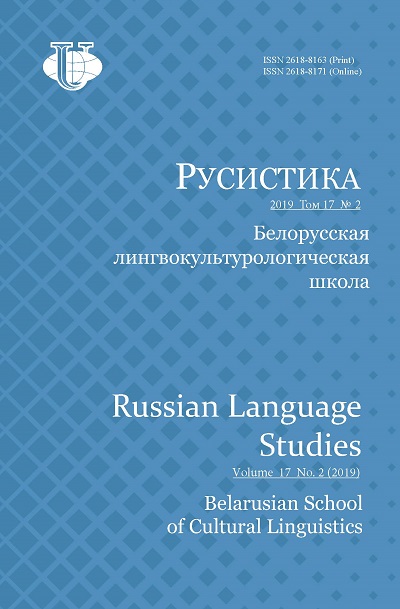Russian language through the prism of national culture and realities
- Authors: Nikalayenko S.V1
-
Affiliations:
- Vitebsk State University named after P.M. Masherov
- Issue: Vol 17, No 2 (2019): Belarusian School of Cultural Linguistics
- Pages: 198-212
- Section: Cultural Linguistics: Theoretical and Applied Aspects
- URL: https://journals.rudn.ru/russian-language-studies/article/view/21115
- DOI: https://doi.org/10.22363/2618-8163-2019-17-2-198-212
Cite item
Full Text
Abstract
The article focuses on the system of developing linguistic and cultural competence through regional realities, values, personalities, etc. in general secondary educational institutions in the Republic of Belarus. The sociocultural aspect in the coherent linguistic methodological system of teaching Russian and developing learners’ speech is considered as a substantial component of all spheres - language, speech, communication, cultural linguistic study . Cultural linguistic (or linguocultural) aspect is realized through mastering language: 1) as a system of preserving and transmissing cultural values, 2) as a means of comprehending general and nationally-specific (for the Russian and Belarusian) ideals, traditions, customs, values and norms which guide the dialogue of cultures. As an interrelated educational process, the sociocultural aspect implies that students acquire the peculiarities of social relations expressed in meanings (peacefulness, non-aggressiveness, tendency to consent and search for compromises, helping another person, denying unmotivated violence, reasonable needs, etc.). The sociocultural aspect also means developing learners’ ability to comply with the norms that determine these relations.
About the authors
Siarhej V Nikalayenko
Vitebsk State University named after P.M. Masherov
Author for correspondence.
Email: ns-lk@mail.ru
dean of the Philological Faculty of Vitebsk State University named after P.M. Masherov, Doctor Habilitat, Associate Professor (Vitebsk, Republic of Belarus). Research interests: methods of teaching Russian, cultural linguistics, axiology. The author of more than 140 publications
33 Moskovskij Prospect, Vitebsk, 210038, Republic of BelarusReferences
- Deikina, A.D. (2014). Metodicheskii potentsial lingvokul’turologicheskikh kharakteristik teksta v shkol’nom obuchenii russkomu yazyku [The didactic potential of linguocultural text characteristics in teaching Russian at school]. Russkii yazyk v shkole [Russian language at school], (4), 12-17. (In Russ.)
- Khudenko, L.A. Lingvokul’turologicheskii podkhod k obucheniyu russkomu yazyku uchashchikhsya 5-11 klassov: teoreticheskie i metodicheskie osnovy [The linguocultural approach to teaching Russian to 5-11 graders: theoretical and didactic bases]. Minsk: NIE Publ. (In Russ.)
- Kovshova, M.L. (2012). Lingvokul’turologicheskii metod vo frazeologii: kody kul’tury [The linguocultural approach in phraseology: culture codes]. Moscow: Librokom Publ. (In Russ.)
- Kontseptsiya obucheniya russkomu yazyku v sisteme obshchego srednego obrazovaniya Respubliki Belarus’ [The conception of teaching Russian in the system of general secondary education in the Republic of Belarus]. (2015). Russkii yazyk i literatura [Russian language and literature], (9), 3-10. (In Russ.)
- Krasnykh, V.V. (2002). Etnopsikholingvistika i etnokul’turologiya: lektsionnyi kurs [Ethnopsycholinguistics and ethnocultural studies: lecture course]. Moscow: Gnozis Publ. (In Russ.)
- Littlejohn, A. (2011). Real world language teaching. Teaching in multilingual contexts: current challenges, future directions, 3-17. Cambridge scholars Publ.
- Maslova, V.A. (2018a). Lingvisticheskii analiz teksta. Ekspressivnost’: ucheb. posobie [Linguistic text analysis. Expressiveness: manual]. Moscow: Yurait Publ. (In Russ.)
- Maslova, V.A. (2004). Poet i kul’tura. Kontseptosfera Mariny Tsvetaevoi [The poet and culture. Marina Tsvetaeva’s conceptual sphere]. Moscow: Flinta Publ. (In Russ.)
- Maslova, V.A. (2018b). Filologicheskii analiz khudozhestvennogo teksta: uchebnoe posobie [The philological analysis of an artistic text: manual]. Moscow: Yurait Publ. (In Russ.)
- Maslova, V.A., & Nikolaenko, S.V. (2011). Kratkii lingvokul’turologicheskii slovar’-spravochnik: kul’turnoe prostranstvo Vitebshchiny [The concise linguocultural reference dictionary: cultural space of the Vitebsk area]. Vitebsk: Vitebsk State University named after P.M. Masherov Publ. (In Russ.)
- Mechkovskaya, N.B., Ivanov, E.E., & Ivanova, S.F. (1998). Satsyyakul’turnaya prastora movy [The sociocultural space of language]. Minsk: Vedy Publ. (In Russ.)
- Mishatina, I.T. (2011). Tekhnologiya osvoeniya kontseptov russkoi kul’tury: uchebno-metodicheskoe posobie [The technology of acquiring the concepts of Russian culture: manual]. Saint Petersburg: Knizhnyi dom Publ. (In Russ.)
- Nikolaenko, S.V. (2015a). Vitebshchina v sotsiokul’turnom kontekste (didakticheskie materialy dlya urokov russkogo yazyka): posobie dlya uchitelei [The Vitebsk area in linguistic and cultural context: (didactic materials for Russian lessons): teachers’ guide]. Vitebsk: VGU named after P.M. Masherova Publ. (In Russ.)
- Nikolaenko, S.V. (2009). Natsional’no-kul’turnoe na urokakh russkogo yazyka (didakticheskie materialy o Belorusskom Poozer’e pri izuchenii grammaticheskikh tem): posobie [National and cultural components at Russian lessons (didactic materials about the Vitebsk area for studying grammar): manual]. Vitebsk:VGU named after P.M. Masherov Publ. (In Russ.)
- Nikolaenko, S.V. (2015b). Teoriya i praktika sotsiokul’turnogo razvitiya uchashchikhsya 5-11 klassov: natsional’no-kul’turnyi soderzhatel’nyi aspekt v kontekste obucheniya russkomu yazyku [Theory and practice of sociocultural development of 5th-11th graders: national and cultural aspect in the context of teaching Russian]. Vitebsk: VGU named after P.M. Masherov Publ. (In Russ.)
- Novikova, T.F. (2004). «Prostranstvo slova». Formirovanie etnokul’turnoi kompetentsii uchashchikhsya na urokakh slovesnosti [“The space of a word”. The development of learners’ ethnocultural competence during language classes]. Russkii yazyk v shkole [Russian language at school], (5), 22-40. (In Russ.)
- Rusetskii, V.F. (2011). Slovotvorchestvo: literatura, yazyk, chelovek v sovremennom mire [Word-creation: literature, language, man in modern world]. Minsk: NIE Publ. (In Russ.)
- Sinyachkin, V.P. (2010). Psikholingvisticheskii i lingvokul’turologicheskii analiz obshchechelovecheskikh tsennostei v russkom yazykovom soznanii [Psycholinguistic, linguistic and cultural analysis of common human values in Russian linguistic consciousness]. Moscow: RUDN Publ. (In Russ.)
- Teliya, V.N. (1996). Russkaya frazeologiya: semanticheskii, pragmaticheskii i lingvokul’turologicheskii aspekt [Russian phraseology: semantic, pragmatic and cultural linguistic aspect]. Moscow: Yazyki russkoi kul’tury Publ. (In Russ.)
- Vorob’ev, V.V. (1997). Lingvokul’turologiya: teoriya i metody [Cultural linguistics: theory and methods]. Moscow: Ekspo Publ. (In Russ.)
- Pretceille, М.A. (1999). L’education interculturelle. Paris: Universitaire de France Publ. (In French).















